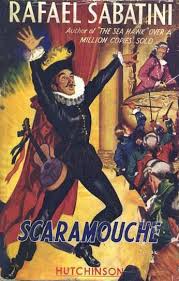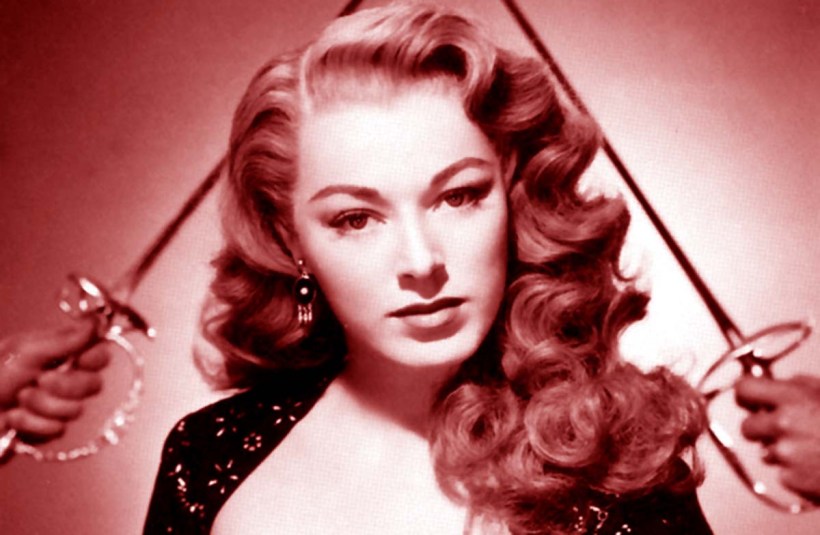 Life imitates art, or something.
Life imitates art, or something.
I was looking for some light entertainment, and so I started reading Rafael Sabatini‘s Scaramouche.
Published in 1921, Scaramouche is one of Sabatini’s most famous novels.
Set during the French Revolution, it follows the adventures – and the growth – of Andre-Louis Moreau a lawyer turned adventurer and revolutionary, as he joins a company of comedians to escape his enemies, assuming the titular role of a sword-wielding buffoon.
The novel combines a fine historical background with some great swashbuckling action, and it is a fun read indeed.
The novel was quite popular and was turned into a number of movies, the most famous of which is probably the 1952 version, with Stewart Granger as Scaramouche and Janet Leigh as his love interest.
I know a lot of people that take exception with the movie, for a number of reasons – the costumes, the actors, the fight scenes.
My chief misgiving about the whole shebang is that in the end Granger goes for insipid Janet Leigh leaving behind the gorgeous redhead Eleanor Parker.

But back to the novel – which is highly recommended – and life imitating art.
At the onset of the adventure, Andre-Louis is quite cynical about the state of France, and indeed, humanity.
“I assure you that I am quite serious. To do what you imply would require nothing short of divine intervention. You must change man, not systems. Can you and our vapouring friends of the Literary Chamber of Rennes, or any other learned society of France, devise a system of government that has never yet been tried? Surely not. And can they say of any system tried that it proved other than a failure in the end? My dear Philippe, the future is to be read with certainty only in the past. Ab actu ad posse valet consecutio. Man never changes. He is always greedy, always acquisitive, always vile. I am speaking of Man in the bulk.”
“Do you pretend that it is impossible to ameliorate the lot of the people?” M. de Vilmorin challenged him.
“When you say the people you mean, of course, the populace. Will you abolish it? That is the only way to ameliorate its lot, for as long as it remains populace its lot will be damnation.”
And here is the curious bit – because I got in the same discussion, which is taken from the first chapter of the novel, almost exactly on the same terms, with a friend this afternoon – he taking the role of Moreau/Scaramouche, while I took the “idealistic” (he said so) positions of his friend Philippe de Vilmorin.
This gave some pause, because, on one hand, I find disheartening that such arguments are becoming so popular among intelligent people – the failure of progress and the base animalistic nature of Man, as if we were forced to follow the same script of our ancestors, our intelligence worthless against our instincts.
This is one step beyond Robert Howard’s ode to barbarism and the idea of civilization being a transitory, ephemeral state. Because if nothing else, Howard believed in the barbarian, and in the barbarian’s simple, straightforward values. But here? Nothing.
The reason why I find this disheartening is that I am convinced that we tend to become what we believe we are, and create the future we imagine – and a culture without hope in its own better features is a culture destined to that catastrophe that seems to be the only future its members are capable of imagining.
The second reason why today’s Scaramouche-like discussion worried me is, of course, that idealist Philippe de Vilmorin is killed in the second chapter of the novel.
Granted, this is the first step in the journey of adventure and redemption of the main character, that will turn into an idealist himself by the end but, you know, somehow that gives me small consolation.
I’ll be careful not to pick any duel with malicious aristocrats in the weekend.
You do the same.
And why duel anyway?
Read a good book!
Interested parties can find Sabatini’s Scaramouche in ebook format, for free, on Project Gutenberg (http://www.gutenberg.org/etext/1947)

26 May 2017 at 21:45
Hm… I don’t know that André-Louis strikes me as especially idealistic in the end, either. I mean, he never quite embraces poor Philippe’s ideals: he wears them as a weapon in pursuit of his revenge, and what he does in the end strikes me as quite calculating – if not downright cynical.
And, for my money, the version to watch is the 1922 silent, with Ramon Novarro as the hero, and Lewis Stone as the evil Marquis. Much more faithful to the novel, and without Stewart Granger.
LikeLike
26 May 2017 at 22:03
I always found Ramon Novarro slightly ridiculous.
As for the character in the novel, he softens up a lot – maybe idealistic is too big a word, let’s say he’s not as heartless as in the first chapter.
But yes, he’s a certainly an opportunist and a cynic at heart.
LikeLike
27 May 2017 at 02:54
Kinda makes me wonder too; just why are so many movie portrayals of humanity’s future, bleak, dystopian futures set after a devestating cataclysm or the ruin left by some tyrannical despot. Are we fated to make that our future because we seem to believe in its inevitability? Too early for this. I haven’t had my morning coffee yet 😫
LikeLike
27 May 2017 at 06:56
Once these were called self-preventing prophecies, as they described a future so scary, people almost automatically started to work against its coming. A good example are books like 1984 and Fahrenheit 451,or all those atom bomb movies of the fifties through the eighties. They worked.
But now people seem to have embraced a sort of helplessness that makes self-preventing prophecies backfire.
It’s scary.
LikeLiked by 1 person
27 May 2017 at 07:04
Agree. Boy I loved some of those 50s atom bombsongs. “Atom Bomb Baby” “Cral Out To The Fallout”
LikeLike